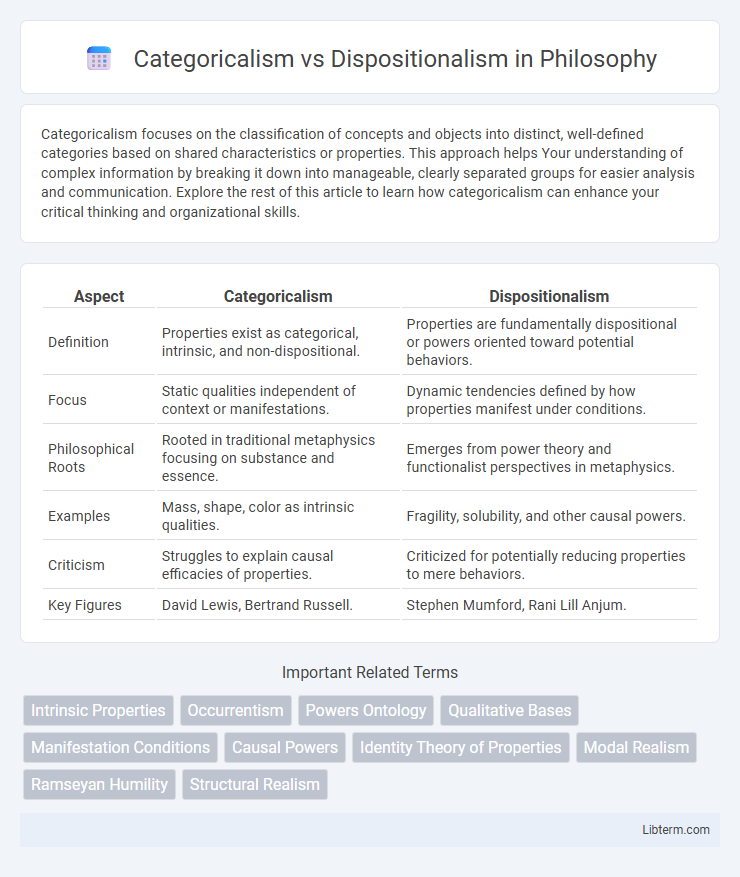Categoricalism focuses on the classification of concepts and objects into distinct, well-defined categories based on shared characteristics or properties. This approach helps Your understanding of complex information by breaking it down into manageable, clearly separated groups for easier analysis and communication. Explore the rest of this article to learn how categoricalism can enhance your critical thinking and organizational skills.
Table of Comparison
| Aspect | Categoricalism | Dispositionalism |
|---|---|---|
| Definition | Properties exist as categorical, intrinsic, and non-dispositional. | Properties are fundamentally dispositional or powers oriented toward potential behaviors. |
| Focus | Static qualities independent of context or manifestations. | Dynamic tendencies defined by how properties manifest under conditions. |
| Philosophical Roots | Rooted in traditional metaphysics focusing on substance and essence. | Emerges from power theory and functionalist perspectives in metaphysics. |
| Examples | Mass, shape, color as intrinsic qualities. | Fragility, solubility, and other causal powers. |
| Criticism | Struggles to explain causal efficacies of properties. | Criticized for potentially reducing properties to mere behaviors. |
| Key Figures | David Lewis, Bertrand Russell. | Stephen Mumford, Rani Lill Anjum. |
Introduction to Categoricalism and Dispositionalism
Categoricalism defines properties based on their inherent qualities and actual states, emphasizing what things are independent of their potential uses or manifestations. Dispositionalism, on the other hand, interprets properties through their tendencies or capacities to produce certain effects under specific conditions. These contrasting views shape fundamental debates in metaphysics concerning the nature of properties, causation, and the structure of reality.
Historical Background and Key Philosophers
Categoricalism and Dispositionalism have distinct roots in the history of philosophy, with categoricalism often traced to Aristotle's substance theory emphasizing fixed properties as fundamental, while dispositionalism finds its origins in the works of John Locke and later philosophers who highlighted potentialities or tendencies inherent in objects. Key figures in categoricalism include Gottfried Wilhelm Leibniz, who argued for intrinsic categorical properties, whereas dispositionalism is notably associated with David Hume's skepticism about intrinsic qualities and C.D. Lewis's defense of disposition-based explanations. These philosophical traditions have continued to influence contemporary debates in metaphysics, particularly discussions on the nature of properties, causation, and the structure of reality.
Defining Categorical Properties
Categorical properties are intrinsic, non-relational qualities that an object possesses independently of its potential behaviors or manifestations, such as the shape or color of an object. In the debate between categoricalism and dispositionalism, categoricalists assert that these properties exist as fundamental features regardless of any dispositions or tendencies an object might have. This contrasts with dispositionalism, which interprets properties primarily in terms of an object's potential actions or responses under certain conditions.
Understanding Dispositional Properties
Dispositionalism centers on the idea that properties are fundamentally capacities or tendencies to manifest certain behaviors under specific conditions, emphasizing the dynamic and relational aspects of reality. This perspective contrasts with categoricalism, which treats properties as static and intrinsic features independent of external circumstances. Understanding dispositional properties involves recognizing their potentiality, where the manifestation of a trait depends on interactions and contexts rather than fixed, isolated qualities.
Core Differences Between Categoricalism and Dispositionalism
Categoricalism asserts that properties exist independently as intrinsic features of objects, while Dispositionalism holds that properties are fundamentally defined by their potential to bring about specific effects or behaviors. Core differences include the ontological status of properties--categorical properties are non-relational and exist regardless of interactions, whereas dispositional properties are essentially relational and manifest only under certain conditions. This divergence influences metaphysical debates on causation and the nature of physical reality by contrasting intrinsic essences with conditional potentials.
Metaphysical Implications of Both Views
Categoricalism asserts that properties exist independently and possess intrinsic qualities, which grounds a metaphysical framework emphasizing objective reality and stable essences. Dispositionalism contends that properties are fundamentally about potential behaviors or capacities, leading to a metaphysics centered on relationality and power dynamics within objects. The metaphysical implications influence debates on causation, identity, and the nature of laws, with categoricalism supporting a static ontology and dispositionalism promoting a dynamic, context-dependent perspective.
Criticisms of Categoricalism
Categoricalism faces criticism for its rigid classification of mental states as fixed categories, which may overlook the fluid and context-dependent nature of human cognition and behavior. Critics argue that this approach fails to account for the variability and complexity inherent in mental phenomena, often leading to oversimplified models. Empirical studies in cognitive science highlight that mental states exhibit dispositional properties, challenging the categorical viewpoint's explanatory power.
Critiques of Dispositionalism
Dispositionalism faces critiques centered on its reliance on potential behaviors rather than actual events, which can render explanations vague or unfalsifiable. Critics argue that dispositional predicates lack clear truth conditions without reference to categorical properties, challenging their explanatory power. Furthermore, the dependence on hypothetical conditions leads to difficulties in distinguishing genuine dispositions from mere tendencies or accidents.
Contemporary Debates and Perspectives
Contemporary debates on Categoricalism versus Dispositionalism center on whether properties are essentially categorical, possessing an intrinsic nature independent of their causal roles, or fundamentally dispositional, defined by their potential effects and interactions. Proponents of Categoricalism argue that properties have a non-relational essence that underpins causal powers, while Dispositionalists maintain that properties are nothing over and above the dispositions they confer. Recent perspectives explore hybrid models, emphasizing the interplay between intrinsic qualities and dispositional tendencies to reconcile tensions in metaphysical property theory.
Future Directions in the Categoricalism vs Dispositionalism Debate
Future directions in the Categoricalism vs Dispositionalism debate emphasize integrating empirical findings from cognitive science and metaphysics to refine the conceptual distinction between properties and dispositions. Advances in experimental philosophy and computational modeling are expected to clarify the explanatory power of dispositional properties in natural language semantics and causation theory. Emerging interdisciplinary approaches will likely foster a more nuanced framework that bridges the ontological commitments of categoricalism with the dynamic nature of dispositional properties.
Categoricalism Infographic

 libterm.com
libterm.com